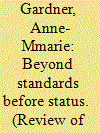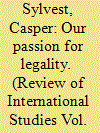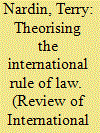| Srl | Item |
| 1 |
ID:
082207


|
|
|
|
|
| Publication |
2008.
|
| Summary/Abstract |
Are international standards of democratic governance applied to sub-state actors as well as to states? By examining the international response to self-determination claims, this article demonstrates that the international community does indeed hold sub-state groups accountable to such standards. Claimant groups that have internalised human rights and democratic norms are more likely to receive international support in the form of empowerment (promoting some form of self-governance). Through a comparison of the Kosovars' quest for self-determination with the Nagorno-Karabakh Armenians' claim, the article suggests that 'standards before status' is neither unique to Kosovo nor a deviation from the pre-1999 international response to that claim
|
|
|
|
|
|
|
|
|
|
|
|
|
|
|
|
| 2 |
ID:
082195


|
|
|
|
|
| Publication |
2008.
|
| Summary/Abstract |
Why have states legalised international norms promoting domestic democracy in some regions of the world? This issue poses a difficult puzzle because standard assumptions about state preferences for sovereignty make the creation of strong, binding international rules on democracy unlikely. We identify four possible answers: the interests of powerful states, common government interests in domestic policy lock-in, the absence of fears that powerful states will use the rules to intervene unilaterally in domestic affairs, and the robustness of pre-existing norms. We explore our argument by applying it to the Organization of American States (OAS), a fairly unlikely organisation for the strong legalisation of international rules. Our findings suggest that legalisation of democracy is quite difficult to achieve. State interests in locking in democratic benefits and state power - even hegemonic power - are necessary but insufficient. An important set of new democracies attempted legalisation in the 1950s, yet failed. The United States, as strong a regional hegemon as ever, attempted further legalisation in 2005, yet failed. Motives and power must be accompanied by low fears of unilateral intervention and high levels of norm robustness in order to produce results
|
|
|
|
|
|
|
|
|
|
|
|
|
|
|
|
| 3 |
ID:
082194


|
|
|
|
|
| Publication |
2008.
|
| Summary/Abstract |
This article deploys a historical analysis of the relationship between law and imperialism to highlight questions about the character and role of international law in global politics. The involvement of two British international lawyers in practices of imperialism in Africa during the late nineteenth century is critically examined: the role of Travers Twiss (1809-1897) in the creation of the Congo Free State and John Westlake's (1828-1913) support for the South African War. The analysis demonstrates the inescapably political character of international law and the dangers that follow from fusing a particular form of liberal moralism with notions of legal hierarchy. The historical cases raise ethico-political questions, the importance of which is only heightened by the character of contemporary world politics and the attention accorded to international law in recent years.
|
|
|
|
|
|
|
|
|
|
|
|
|
|
|
|
| 4 |
ID:
082206


|
|
|
|
|
| Publication |
2008.
|
| Summary/Abstract |
This article develops a political economy account of global environmental governance to improve upon our understanding of the contemporary conduct of environmental politics and to clarify thinking about the potential for, and barriers to, effective environmental reform. By elaborating the key contours of a political economy account on the one hand and opening up to critical enquiry prevailing understandings of what is meant by 'global' 'environmental' and 'governance' on the other, such an approach is able to enhance our understanding of the practice of environmental governance by emphasising historical, material and political elements of its (re) constitution and evolution
|
|
|
|
|
|
|
|
|
|
|
|
|
|
|
|
| 5 |
ID:
082193


|
|
|
|
|
| Publication |
2008.
|
| Summary/Abstract |
Recent trends in international law scholarship recycle objections to international law advanced by an earlier generation of political and legal realists. Such objections fail to understand the place of international law in the global order. To understand that place, we must distinguish the idea of the rule of law from other understandings of law. That idea is an inherently moral one. Theories of international law that ignore the moral element in law cannot distinguish law as a constraint on power from law as an instrument of power. A Kantian theory of international law can help to recover that moral element
|
|
|
|
|
|
|
|
|
|
|
|
|
|
|
|